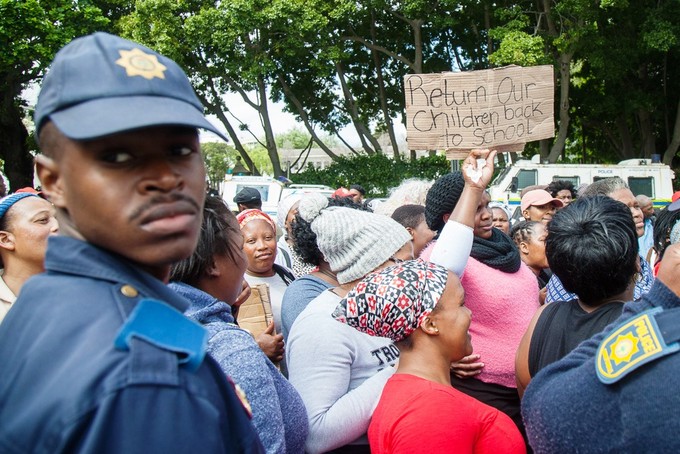
About 150 Students and workers protest against the disciplinary tribunal of UCT students outside Belmont Square in Rondebosch. Photo: Ashraf Hendricks
15 September 2016
Today, more than 150 students and workers marched from the Belmont Square Conference Centre to University of Cape Town (UCT) Upper Campus, singing and interrupting traffic, to protest against outsourcing, low wages for workers, and suspensions and expulsions of student activists.
Protesters first gathered outside Belmont Square, where a tribunal was being held to discuss disciplinary matters concerning three students who were suspended from UCT following protest actions. At least 25 SAPS officers holding weapons and riot shields formed a barrier to keep protesters from entering the centre.
A statement released by ‘SRC candidates of the suspended elections’ for the Student Representative Council cited police violence, campus rape culture, suppression of student activists and free education as issues the university should address.
The group demanded to be allowed into the student disciplinary tribunal as a collective of witnesses for the suspended students, but were told only one person could enter as a witness.
Masixole Mlandu, one of the suspended students and a candidate in the suspended elections, spoke to the crowd at Belmont Square. “We are not going to come one by one — we always come as a unit … If the tribunal does not allow all of you in, we cannot participate.”
The group then marched towards Main Road, Rondebosch, where they halted traffic for several blocks. Along their route to campus, they pulled workers for Sibanye and C3 Catering from their posts to join the protest. They also surrounded a Jammie bus on Woolsack Drive.
Marchers continued through campus, stopping in front of Jameson Hall, where a gymnastics demonstration was taking place. The protesters interrupted the demonstration, forcing the gymnasts to leave. They sang protest songs before a crowd of about 300 UCT students that had gathered.
“The main issue is of suspended and expelled students. It has now been approximately eight months [since the suspensions],” Mlandu told the crowd.
“If UCT is the top university in the continent, they should lead by example and represent the aspirations of the majority of this continent. We are not here to fight, but we don’t mind fighting.”
Student Khululwa Mthi read aloud the statement from suspended candidates for the SRC.
Mam Nozi, a worker, spoke about the struggle of workers on campus. Siroxolo Boyi, a student, explained the tribunal process and the events of the morning for those who were not present. Thebe Longwe, another student, explained that workers and students must join together to protest UCT’s inaction on important issues.
“The workers’ struggle is synonymous to the students’ struggle,” he said. “They are working for these institutions, yet they have nothing to show for it at the end of the day.”
Workers from the strike at Robertson Winery also joined the protest, calling for a boycott of the company until it institutes a living wage for workers.
Mlandu said following the initial suspensions, students had called for a process similar to the Truth and Reconciliation Commission, where students and the vice-chancellor would openly discuss the students’ complaints and try to resolve them, but he said they were turned down.
“We wanted an open dialogue instead of a punitive process, but the university refused,” he said.
A statement from UCT spokesperson Kylie Hatton in response to the protest emphasized the small number of students who have been suspended and that they were suspended for acts such as arson and vandalism.
‘Given that thousands of people have engaged in protests, even disruptive ones, over the past 18 months, it is evident that the [Student Disciplinary Tribunal] and interdicts, which involve five students, are not a tactic to undermine protest,’ the statement read.